You've seen them compared in blog posts, productivity videos, and team Slack channels: Airtable and Notion are widely considered to be some of the best platforms for building out efficient internal tools.
Airtable is noted for for its familiar spreadsheet look, curated structure, simplicity, and fantastic built-in automation and permission management. Notion is known as the flexible, "do-it-yourself", all-in-one workspace for blending data and content, ideal for building a centralized internal operating system that includes wikis and notes.
Depending on who you ask, either one could be the tool to organize your life, run your team, or build your entire internal business structure.
Both tools promise to replace scattered spreadsheets, disconnected workflows, and the headache of switching between platforms. Both have the ambition to replace a dozen other tools. And both have rapidly evolved far beyond their original roots - Airtable was initially built as a powerful spreadsheet alternative, Notion as a modern documentation tool. They've blossomed into fully-fledged no-code app builders and automation engines.
But as their features expand, so do the trade-offs.
In this article, we’re not picking favorites - we’re asking a more useful question: which platform is more suited to the way you work?
To answer that, we’re pitting them head-to-head across six essential pillars - areas that inform how these platforms function in the wild:
- Databases
- UI Design
- Automation & Integration
- Permission Management
- Pricing
- Ease of Use
We’ll walk through how they perform in each category - and where they reveal their strengths and weaknesses.
Then, we’ll wrap up with a few extra features that might tip the balance depending on your needs: collaboration, scalability, mobile support, and offline mode availability.
Let’s get into it.
Databases: Airtable’s structure vs Notion’s flexibility
Both Airtable and Notion let you build relational databases - you organize your workflows in a standardized way, link related data (like tasks to projects), use different field types, and create custom views that support how your team works.
On the surface, they do a lot of the same things. But the differences become pretty clear once you start using the two platforms. How do Notion and Airtable’s databases compare?
Airtable is a database that doesn’t feel like one. You start with rows and columns, the same as you would with a spreadsheet, but you’re free to switch things up: turn it into a calendar, a Kanban board, or a gallery. It’s built for structure, and it’s good at staying organized, even as things scale. The spreadsheet visual makes Airtable feel familiar: you know what you’re getting yourself in for, it’s straightforward to work with.

Notion, on the other hand, is more like clay - you shape it however you need. You can build tables and link them just like in Airtable, but the big difference is that every database item in Notion is also its own content page. With this functionality, Notion goes beyond storing structured data and allows you to add detailed context with easy accessibility.

Project plans live inside project records. Meeting notes stay with the meeting record. Creative briefs sit right within the marketing campaigns they’re part of. If content and wider context plays a big role in your data workflow, Notion makes a lot of sense. Nevertheless, do be wary of permissioning and security in Notion’s database system - more on that below.
On the other hand, Airtable’s databases stay more performant as your data needs grow. You get more field types out of the box (like barcodes and ratings), stronger computation capabilities (thanks to a wider set of formula functions), and better overall stability when you're working with lots of records or more complex logic. Notion’s (relatively) new Formulas 2.0 are a big step forward, but once things get heavy, performance still tends to dip more than Airtable’s would.
Do note that both platforms have data limits that depend on the pricing plan and neither of them are particularly performant when databases exceed 200k records.
Airtable: Better for managing structured, larger, and more complex data sets.
Notion: Better for blending content and context with flexible relational database logic in a centralized location.
UI Design: Airtable’s simplicity vs Notion’s customization
This is where the two platforms really start to feel different. Airtable keeps it clean and simple. Notion lets you go wild with creativity (and that’s not always a good thing).
Airtable takes a structured, opinionated approach to UI. You can build forms, dashboards, and interfaces, but it’s all within a clearly defined system that has hard limits for customization. Until the end of 2021, Airtable didn’t even offer a way to build a more custom UI on top of your data. And honestly, a lot of users are still perfectly happy with the “backend-y” spreadsheet feel and don’t use the Interface Designer at all. Airtable keeps things straightforward, curated and, therefore, hard to mess up - it's an easy place to start.

Notion, on the other hand, gives you full creative control. Everything is a block: text, databases, pages - literally everything. And you decide how it all fits together (think Lego). You can design something beautifully tailored to your workflow, or you can accidentally build a tangled mess of pages and databases that no one wants to touch. And it happens faster than you'd think, especially if you’re very lenient with your permission structure and the wrong people get their paws on your pages.

Visually, Notion is minimalist by design. No color-coded calendar entries, no conditional formatting for rows or columns. If you rely on visual cues to stay organized, Airtable does that far better.
Airtable also has stronger built-in tools like forms and charts. Notion only launched these recently, and while they’re catching up, they’re still not on the same level. That said, Notion does let you publish pages as simple, lightweight public websites, which Airtable doesn’t support out of the box.
Airtable: Clean, structured, and easy to navigate - but very limited when it comes to UI customization.
Notion: Minimalistic with total layout freedom, but more danger of over-designing, creating chaos, and over-complicating your setup.
Automation & Integration: Airtable’s power vs Notion’s visibility
Airtable gives you more to work with than Notion straight away: more triggers, more actions, scripting (JavaScript), and an automation engine that’s actually quite powerful for a no-code tool.
You can loop through records, bulk update data, and even run AI-powered actions like generating insights or prompting AI to build new columns with the new AI Assistant (currently in beta).

Notion’s still catching up in this area. They’ve recently introduced scheduled automations and webhooks, and the Notion API is improving, but it’s still clunky to work with. Plus, since everything is treated as a block (paragraphs, images, headers, etc.), automating anything that relates to page content (like embedding instructions in the page body of a task via the Notion API) requires wrangling a long list of nested blocks. It works, but it’s not the most pleasant experience.
That said, Notion does shine when it comes to syncing knowledge and information across tools. It connects with tools like GitHub, Slack, Jira, Google Docs, and more - and with Notion AI layered on top, you can browse all of those data and knowledge sources from within Notion. That makes it great for centralizing and surfacing information in one place, especially for teams working across multiple tools.

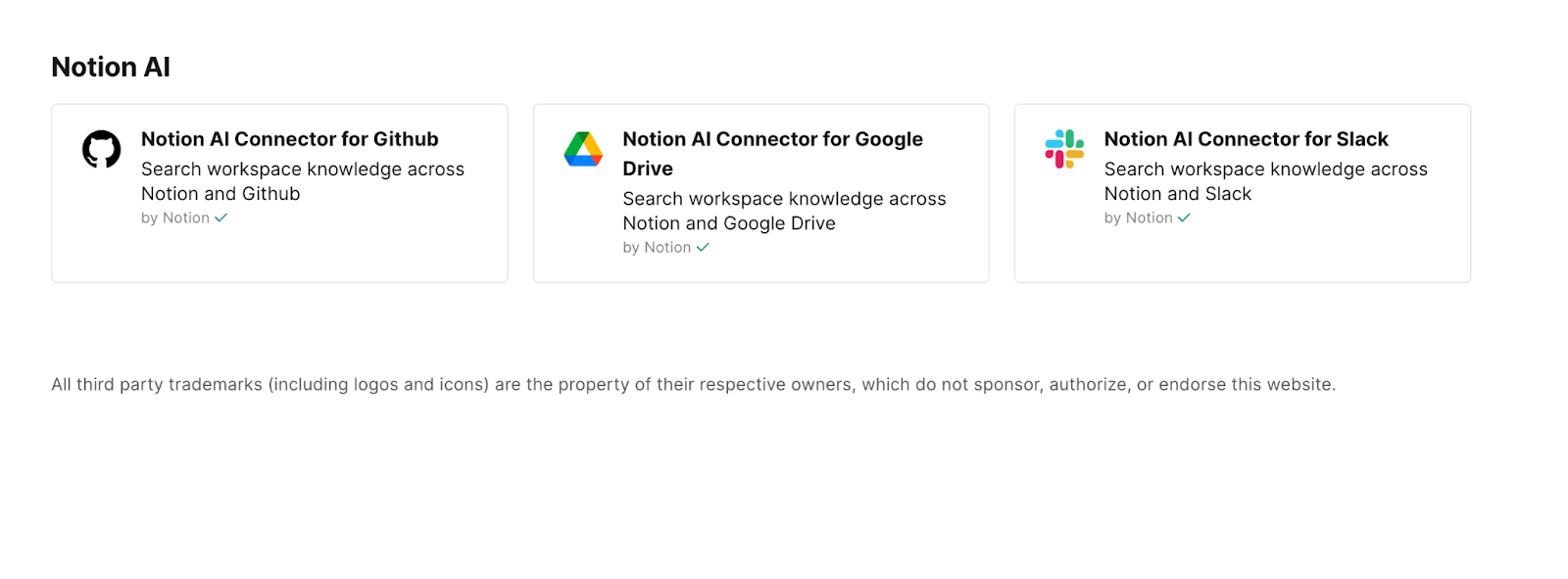
Airtable, by comparison, is better when you're building structured workflows that need automation power and clean API access. It’s got more mature developer tools, more advanced enterprise integrations (like SCIM and audit log-related API endpoints), and generally gets first-class treatment from third-party platforms.
Airtable: More automation power, better API, and stronger support for structured automated workflows.
Notion: Better for syncing across tools and pulling knowledge into one central place from multiple sources like Slack, Google Drive and GitHub.
Permission Management: Airtable’s control vs Notion’s leniency
Airtable and Notion take very different approaches to permissions, and it mostly comes down to how much control you need vs how much visibility you want to enforce within your company (and how much flexibility you can live with).
Airtable leans heavily into control. You can manage access at every level - base, table, view, and even individual fields. You can lock certain columns, limit editing rights, and create tailored views for different roles without duplicating anything. If you're working with sensitive data, want to support client-facing workflows, or just want to avoid accidental edits, this level of granularity goes a long way.
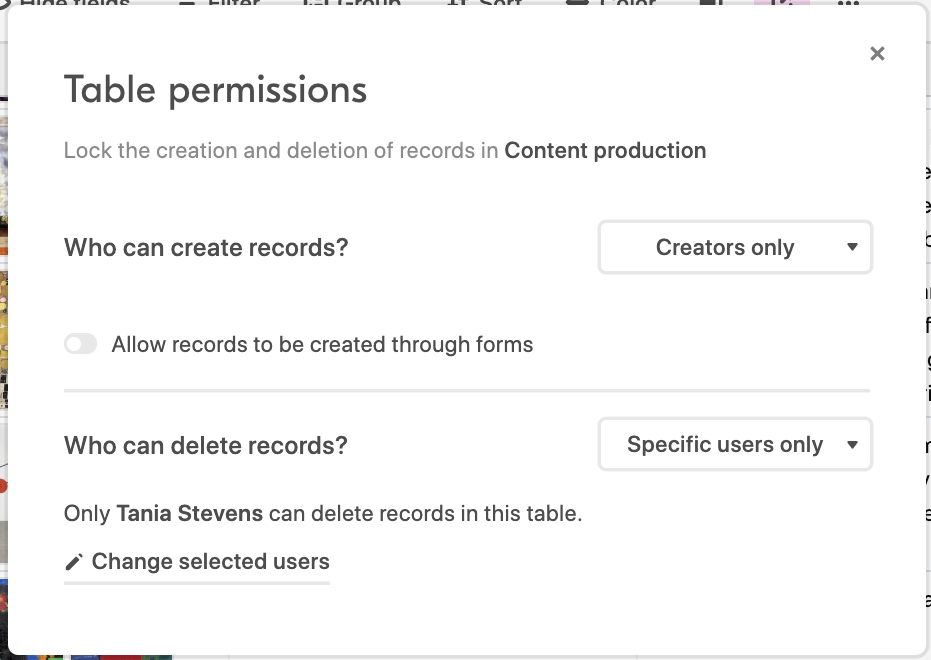
Notion, on the other hand, is more permissive, and there are two main reasons for that. First, it fits their philosophy: Notion is designed to be a connected workspace. The goal is to remove bottlenecks and give team members visibility into what other teams are doing. Second, and less intentionally, is how the platform is built. Because everything is a block, it’s much harder to enforce granular control without breaking the flexibility that makes Notion so appealing.

Permissions are primarily defined on the page level in Notion, and cascaded down to subpages. There’s no built-in row-level or column-level permissioning on databases (yet), and workarounds like building team-specific, disconnected databases (like team-specific project databases) don’t scale. In fact, they go against Notion’s main philosophy of connectivity.
This lack of granularity in its permissioning features has been a long-standing pain point and is widely demanded among the Notion community, and Notion has acknowledged it too. There are rumors in the Notion community that we can expect improvements in this area in the next year (or two).
Airtable: Granular and tight permission controls that scale with teams and complexity.
Notion: More open by design - great for visibility, but limited when it comes to controlling who sees what.
Pricing: expensive Airtable vs accessible Notion
Pricing is one of the few areas where the gap between Airtable and Notion is very clear.
Notion keeps it simple. Enterprise pricing starts at $25/user/month, with bulk discounts available if you’re a larger team. For that price, you get access to everything but Notion AI (Notion AI is priced separately at $10 per month). It’s transparent, easy to understand, and scales extremely well as your team grows. Notion’s pricing is one of the cheapest in the no-code industry.

Airtable, on the other hand, gets expensive quickly. $25/user/month only gets you their lowest paid tier. Enterprise pricing isn’t public, but most estimates put it somewhere between $80–$100/user/month, depending on your needs and volume. And once you start needing things like advanced automations, granular admin controls, or premium integrations, you’re almost certainly moving into that enterprise range.
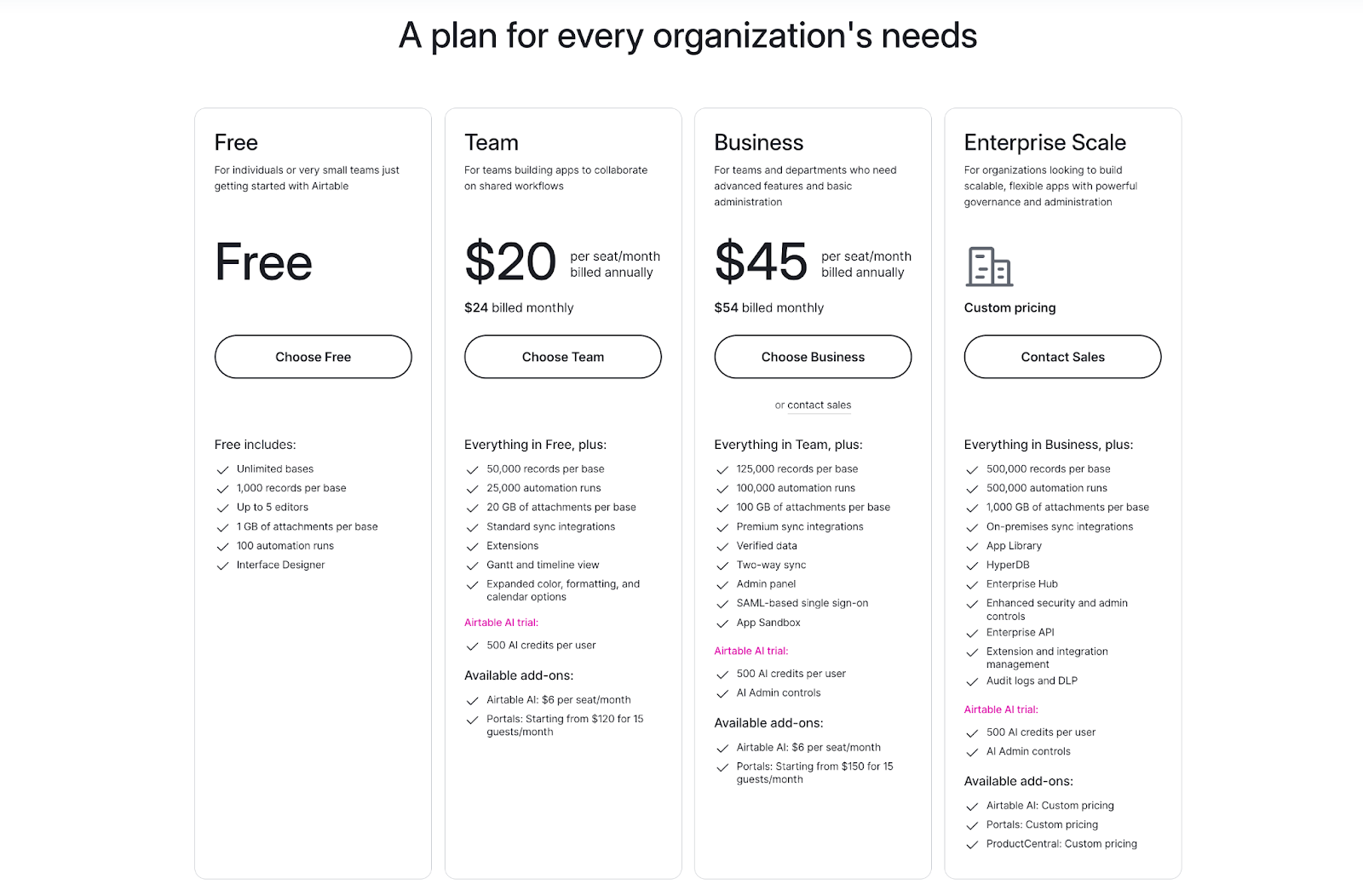
For startups or teams that are most concerned about costs, Notion is the more budget-friendly option. It gives you much more for less, and it’s easier to forecast what you’re going to spend. It’s also a great option for Enterprises that require a lot of seats - the bigger the team, the more the cost savings will show. Airtable asserts its value in terms of power and scale, but you’ll definitely pay for it.
Airtable: More expensive - especially at the enterprise level, with less clarity on what you’ll pay.
Notion: Simple, transparent pricing that scales well with team size.
Ease of use: Airtable’s easy-start vs Notion’s easy-overdo
With Airtable, it’s difficult to get lost beyond redemption - there’s always a relatively intuitive or straightforward solution. If you’ve used Excel or Google Sheets, the UI feels familiar and safe, and the platform itself acts as a kind of guardian for your data management, limiting what you can do just enough to keep things manageable. You’re working within a defined system, and that system helps prevent chaos, dealing with the complicated background stuff so that you don’t have to. You can get up and running fast, even without reading the docs.
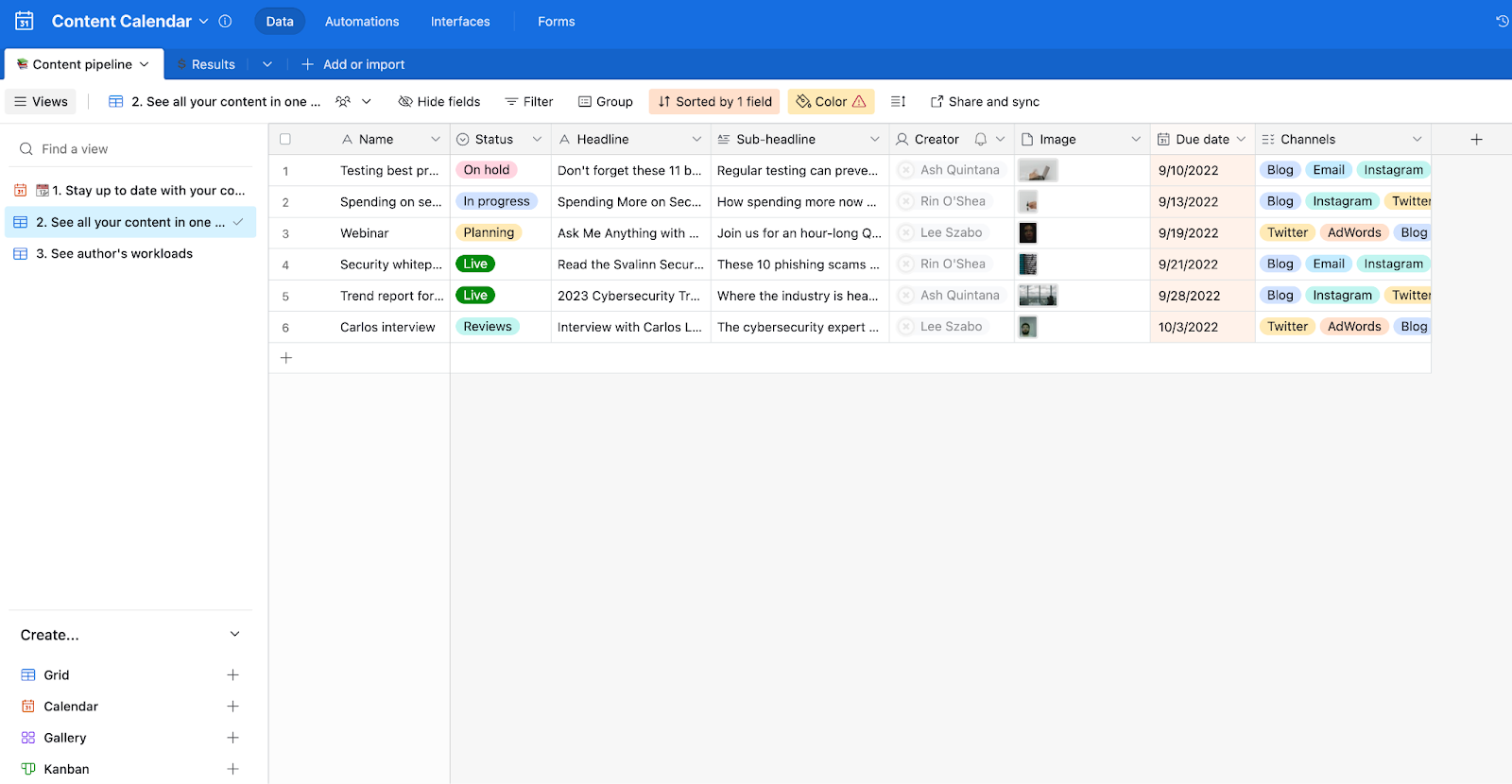
Notion, on the other hand, gives you a blank canvas. You can build anything, which means you also have to decide everything. That’s exciting for some teams, but overwhelming for others. The flexibility is powerful, but it also creates room for inconsistency. It’s easy to Frankenstein a bunch of templates together into something that technically works, but it all ends in monstrous tragedy when the system falls apart.
The learning curve with Notion isn’t steep because it’s difficult - it’s steep because it’s just so flexible. For smaller, scrappy teams that need the space to evolve quickly, flexibility can be a good thing. But for larger orgs or more, rigid complex systems, having someone who really knows how to design in Notion (or hiring a consultant) is often the difference between “neat workspace” and “what are we even looking at?”
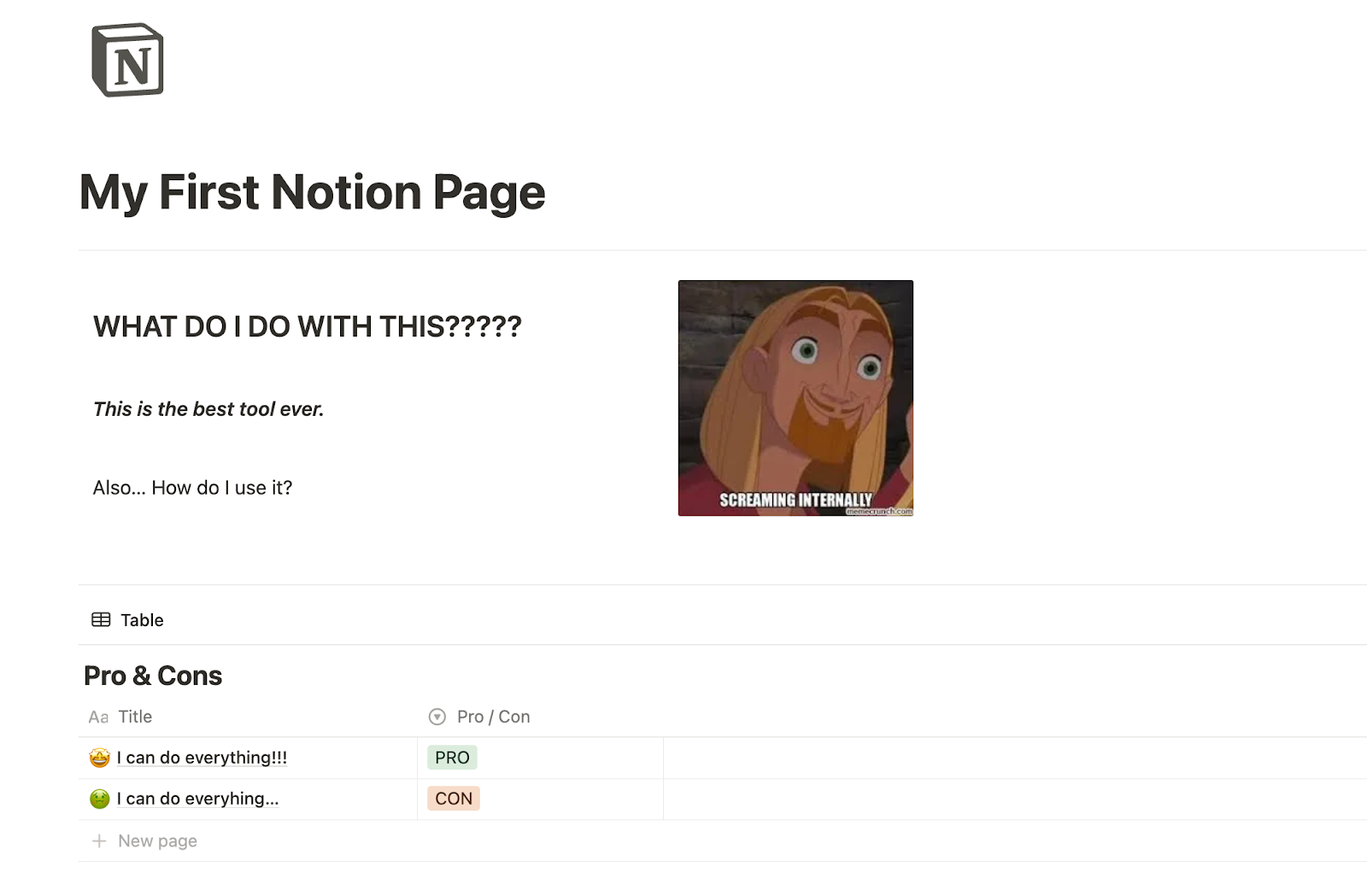
Airtable: Easy to learn, hard to break - great for fast onboarding.
Notion: More flexible, but needs more intention (and maybe a Notion architect) to design curated workflows that scale well
Other Features: A Few More Things to Know
Beyond the main pillars, there are a few other important things to keep in mind. Depending on how your team works, these might end up mattering more than you'd expect.
Collaboration
Notion is built for collaboration, especially when your work lives at the intersection of data and content. Real-time editing, comments, mentions, inline docs - it’s all in one place, and it feels seamless. Though once sensitive data enters the picture, the lack of granular permissions becomes a real limitation.
Airtable handles collaboration well too - comments, mentions, shared views - but usually needs a separate content layer like Google Docs (or Notion, LOL) to fully support how people work together. It’s more segmented, but you get more control.
Scalability
Airtable holds up better with larger datasets, especially when you’re linking between tables or working with complex formulas. It’s more stable at scale. That said, it’s not limitless - you’ll still run into performance issues if you’re pushing tens of thousands of records.
Notion tends to slow down under similar pressure. But where it shines is pricing scalability - costs stay flat and predictable even as your workspace grows, which matters more than most teams expect once headcount starts climbing.
Mobile & Offline Support
Both platforms offer mobile apps, but neither platform nails the mobile use case, and neither has an offline mode, which can be a dealbreaker for teams on the move.
Final Thoughts on Notion vs Airtable: Which One Should You Choose?
Airtable and Notion aren’t trying to be the same tool - they just happen to overlap in interesting ways. Airtable's structured, while Notion's flexible. Airtable prioritizes control, Notion, visibility. Which one is right for you depends entirely on how your team thinks, builds, and grows. Here’s our recommendation:
Pick Airtable if:
- You’re working with structured, high-volume data and need it to stay fast and organized.
- You want robust automations, strong API support, and developer-friendly integrations.
- You care about granular permissions and secure access controls.
- You’d rather work within a system that keeps things simple and tidy, rather than design from scratch.
Pick Notion if:
- Your workflows involve both data and content, and you want them to live in one place.
- You want the flexibility to design your own systems and layouts from the ground up.
- You want a more affordable, scalable platform that grows with your team.
- Your teams are working across multiple tools like Slack, Jira, GitHub, and want one, central place to centralize your operations and surface your knowledge.
And if you’re not ready to decide just yet, that’s okay. The benefit of no-code tools is that they’re easy to try, quick to test, and forgiving if you change your mind.
If you’d like to do some further comparison with other potential tools for your purposes, head to our other articles. We’ve also got plenty more content on Notion and Airtable.



